Farming South Africa – Crop Farming | Livestock | Market Prices
Farming South Africa is a website that gives you information about poultry, pig, vegetable farming and the agriculture sector. We have created tools to help you calculate your feeding, videos that will help you with DIY projects and teach you how to make feed for animals to save you costs. Farming in South Africa | Crop Farming | Livestock | Market Prices
Want to become a Farmer in South Africa?
There are many reasons to start farming in South Africa, we have great soil in all 9 provinces. Farming in general is a profitable business provided that you have land and plenty water. You will have to determine what will work in your area as you can plant and harvest crops like peas, wheat, barley and oats with winter rain but other crops like corn for an example will need water.
Top Crops in SA include but is not limited to
- Barley
- Wheat
- Corn
- Various Fruits like Oranges, Grapes, Apples, Pears and much more.
- Lucerne (Alfalfa)
- Sunflowers
- Cotton
- Canola
- Potatoes

South Africa is well known for live stock farming and export meats all over the world. The most popular form of livestock that is farmed in SA is:
- Cattle
- Goats
- Sheep
- Game
- Pigs
- Poultry
How to start Poultry Farming in South Africa
Poultry farming is generally the farming of chickens, ducks, quail and ostriches. In this paragraph we will discuss Chicken farming and what you need to consider when farming with chickens.
- Coops or Housing for Chickens
- What type of bedding you will use
- Taking care of your chickens
- Feeding your chickens
- How to sell your chickens
As the human population increases, the poultry industry continues to grow to meet the demand for poultry products in world markets. The importance of poultry farms lies in the quality of products that are provided to humans.
You will need to understand the basic rules of Chicken farming. You can read this article to get more insight about chicken farming click here
Chicken Coops or Housing for chickens
Reasons why poultry should have housing
- To protect and shield them from floods, rain and the sun
- To shield them from hunters – dogs, cats, snakes, fowls of prey, rodents and hoodlums
- To forestall mice, rodents and different feathered creatures from eating their feed and sending infection
- A protective spot to lay eggs
- Protecting the chicks from Falcons
This is a great read before you start setting up your coops for chicken waterers and bedding Reasons why Chickens should have housing
What type of bedding you will use for day old and layer chickens?
What bedding should you use for Day Old Chicks? Sawdust is perfect for day old chicks as their only living in the coops for six weeks whereas layers live in coops for roughly 18 months. and therefore we would suggest wood shavings. Materials that can be used:
- Sawdust
- Wood Shavings
- Straw-bales
Read the complete breakdown on bedding for your chickens We have included a couple of videos.
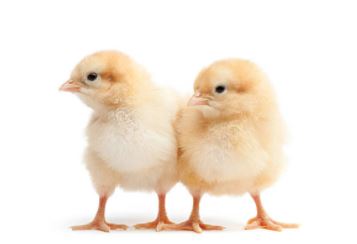
Farming South in Africa
Taking care of your Chickens
We provide you with tools, skills and an overview of all farming related topics plus you get loads of free information to help you get started. Online feeding calculators, free eBooks, how to build chicken coops, waterers and tons of resources that you will need to start farming.
This guide is oriented for beginner farmers, people interested in homestead and backyard farmers.
The perfect guide to start Farming for success is a article that will help you plan your strategy and look at the pro’s and cons of chicken farming.
Feeding your chickens
The process of feeding is very simple. Make sure that when you are buying chicken feed for layers, broilers (meat birds), chicks, growers, and show birds are right formulation for your chickens. As a backyard chicken raiser, you have certain flexibility in regards to what you will feed your chickens.
Feeds are available to suit the changing needs of the chickens. Chicks can be fed a “starter” mix until they are feathered out. Then they can be fed maintenance or grower feed until they start laying eggs. Layers can be fed egg boosters and scratch.
Feed comes in three forms:
- Mash – It is powdery fine feed just like it sounds. If not contained properly in feeding trays chickens scratch and kick it around so you will lose feed and it becomes wasteful
- Pellets – They are made of compressed mash. They are recommended for older birds. Chickens can still pick them up even after they are kicked out of the feeders. In the pellet-making process, the mash is treated with steam and then passed through a suitably-sized dye under pressure. The pellets are then cooled quickly and dried by means of a forced air draft.
- Crumbles – They are broken pellets. These are recommended for the chicks.
What a chicken farmer should always bear in mind is the importance of water in the lives of chickens. A chicken’s body is more than fifty percent water. It is very important to always provide water to your chickens.
Too little water results in dehydration, stress and a decline in egg production. When deprived of water for 24 hours, chickens will need another 24 hours to recover completely.
Chicks will require around a 4 liters of water per 100. Mature birds need about 250 ml of water per day. Laying chickens need more water than non-laying ones. Water should be clean, fresh, and available at all times.
Chickens need feed that contain the following:
- Grains – Whole, living grains are always better than cracked grains. As much as possible, chickens should be given a mixture of grains.
- Greens – Chickens should get grass, weeds, and fresh vegetable parings from the kitchen.
- Protein – Chickens get enough bugs during the summer, but they need protein supplement like soybeans, worms, milk and meat during the winter.
- Hard grit – This is quartz-based sand with angular edges (not rounded like that found in riverbeds). This takes the place of teeth.
- Calcium – There is a lot of calcium in greens if the chickens can forage all day. Supplements can be obtained from crushed oyster shells, various other shells and from ground or hammered bone.
- Vitamins A and D
- Salt – It is best given separately. Kelp is the supreme choice for this.

Farming South in Africa
Tip: How to make your own Chicken Feed for Broilers and Layers
Breakdown of ingredients used to make Chicken Feed
When making your own chicken feed it is important to bag it and store it as you do not want to loose any nutritional value and moist. You do not need to crush your grains and chickens can eat whole corn (mielies), it is actually better as the corn pips does not loose oils and vitamins.
Chickens do spill when they eat, so feeding them whole grain feed will save you money as they will pick up the spills whereas a powdered feed will be lost. For smaller chicks you can crack the grains.
For layers grains are healthier and will produce better eggs with harder shells. You still need to get the balance right as they need calcium, vitamins, protein and calories.
When you buy chicken feed at the stores (generally 14% to 16%) you need to know that there is nothing wrong with that mix, but with you own mix you can increase the protein levels especially when it comes to broilers.
See: How to make your own Chicken feed for broilers and layers
Feeding Calculator
Farming South Africa has developed a Feeding Calculator to help you easily determine how much feed you need to give your chickens.
The goal of this chicken feed calculator is to simply help you get an quick estimate on how much chicken feed you will need for your broilers or layers. Although these numbers are quite accurate, we do not take responsibility for mixing or feeding and you should consult if you are not sure.
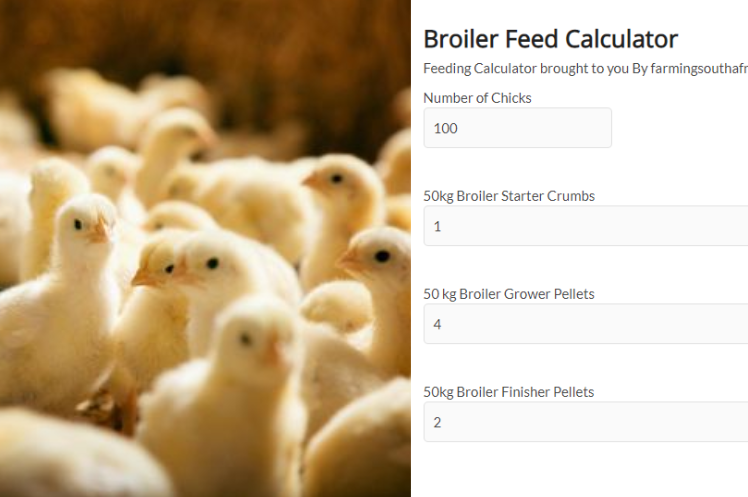
Feel free to use our feeding calculator click here
How to make a Chicken Feeder
Chicken Farming in South Africa can be very expensive especially when you start out as a beginner. In this article I will show you how I made my own chicken feeder and it works well. So I decided to share my idea on How to make a Chicken Feeder and truly hope that you will benefit from this video.
I did not plan this project and made it up as I went along. I got the idea when I saw an old drain pipe laying around. Then I started to look for old planks and was fortunate enough to get all the parts that I needed from a previous project.
You can off-course go out and buy the materials I used in this video to make a chicken feeder and it will still end up being cheaper, but if you are fortunate enough to recycle and use that material, why not?
How to prevent diseases when farming with chickens
It is very important to spend some time each day observing every animal carefully. In this way early signs of disease, malnutrition, or other problems may be discovered, and the necessary precautions taken. How to prevent diseases when farming with chickens
Knowing each hen will also help you choose eggs from the best hen for hatching, so that the chicks may inherit her qualities.
Read the full article on making sure that your chickens are disease free
Want to start a chicken farm but have no idea with how many to start
How Many Chickens Do You Need To Make A Profit? The response to this inquiry isn’t many. The more significant question you should ask yourself is the number of chickens do you need to earn enough to pay the bills and make a comfortable living.
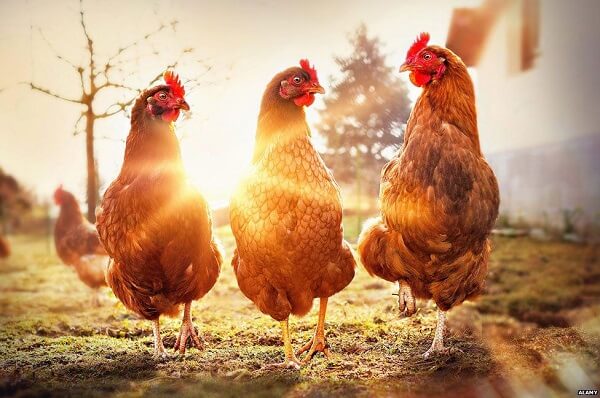
On the off chance that you need to really benefit from your hens you truly need to comprehend a couple of things. The data in this post goes for anyplace on the planet. On the off chance that you are raising chickens to earn enough to pay the rent. At that point there are a couple of rules to follow and you can’t flop however to make a benefit.
What is the best chicken breed to farm with in South Africa?
There are many chicken breeds to farm with in South Africa. Upcoming Broilers and Layer chicken farms are reaching a high in cities all over the country as unemployment reached an all time low in SA. Aspiring farmers are using all types of land and even backyard to start a farming business as chicken farming is trending and very profitable

Here you will find the list of the 50 most popular and best chicken breeds to farm with
Want a free Chicken Farming eBook? click here to get a poultry farming eBook
To start farming with Poultry or Chickens you will need a Business Plan
Farming in South Africa
Chicken Farming Business Plan South Africa – In this article we have put together a guide of two simple chicken business plans for both small scale farmers and intensive or larger scale poultry farming. A small scale business plan will guide you how to farm with chickens and a more advanced plan feature points that you can present to the Bank for a loan or Government Funding.
But let me explain why you need a business plan. A business plan is a written tool about your business that projects 3-5 years ahead and outlines the path your business intends to take to make money and grow revenue. Think of it as a living project for your business, and not as a one-time document. Break it down into mini-plans – one for sales and marketing, one for pricing, one for operations, and so on.
- Backyard or Small Scale Chicken Farming Business Plan
- Intensive or larger Chicken Farming Business Plan

Farming South in Africa
Breakdown of a Backyard or Small Scale Chicken Farming Business Plan
- Housing Cost
- Bedding Cost
- Feed and Water Cost
- Health and Treatment Cost
- Marketing and Marketing Cost
- Wages
- Sales
We will look at the basics and profitability of small scale farming. This article will guide you to setup your business plan.
How to start Pig Farming in South Africa
What you need to know when you want to start farming with pigs
When starting pig farming in South Africa you will need a plan. In fact, everything pig farming enterprise needs a plan, from the thousand-sow unit to the two-pig herd in the backyard of a poor-resource owner wanting to increase his family’s income.
Whether it is a large commercial pig farm or a tiny one, the basic planning rules are the same. The first thing to start with is the desired outcome, the end result. Do you want to breed and sell weaners? Or buy weaners and grow them to slaughter? Or buy and sell pigs as a speculator? Or breeding and raising young pigs up to slaughter-age?
The second thing to consider when starting a pig farm is to estimate the market requirements – how flexible, seasonal and what competition there already is.
Thirdly, consider the restrictions, regulations, health and environmental by-laws, town planning intentions for the town or area you plan to set up your farm?
Training and Advice for New Pig Farmers
The most prominent and active organisation is the South African Pork Producers Organisation (SAPPO), to which most commercial producers belong. SAPPO is now increasing their membership among the aspirant small-herd section of pig farmers.
SAPPO has access to levy funds contributed by commercial farmers and collected at slaughter on a per-head basis. These funds are, in consultation with the government, employed for the promotion of the pork industry and a percentage is directed to developing farmers for activities related to upliftment and training. These funds, are not cash for funding new businesses or feed costs.
The Pig Veterinary Society (PVS) is a group of the South African Veterinary Association which works in close cooperation with SAPPO and commercial producers in organizing training and advisory courses, practical demonstrations and planning sessions. These training sessions focus on biosecurity, welfare, feeding and housing of pigs, disease prevention and management.
The most important factors you need to know when you want to start farming with pigs in South Africa
- Pig will need housing
- Pig nutrition
- Best Pig breeds to farm with in South Africa
- Most common pig diseases
- How to sell pigs and make a profit
- How to measure a pig without a scale by only using a rope
Farming with Pigs – Build your own pig house (Pig Pen)
Building pig houses in South Africa are expensive so when you decide to build one, do it right. Make sure your flooring is done correctly and that the water runs to the drainage systems. Pigs don’t get lonely, but they do prefer to have a friend.
Water Nipples is available at most Agri stores in South Africa, so use it as it limits wastage and your pig house would stay cleaner for a longer period of time. Make sure that the feeder is high enough so that the sows and piglets can enjoy a good meal.
See how to build your own pig pen with a video
Nutrition for pigs
Feed is the biggest cost factor in pig production and can amount to 60 to 80 % of the total cost of production. It is essential to give pigs the right amount of nutrition to flourish in your farming business. Starting from when they are weaned to fully grown pigs
Correctly fed pigs will ensure:
● efficient reproduction and growth
● efficient feed utilisation
● good-quality meat
● maximum profit for the farmer.
Pigs must, therefore, be fed the correct quantity of the right feed mixture. The nutrient requirements, especially digestible energy and protein, of the various production classes, differ. Nutrition for Pigs
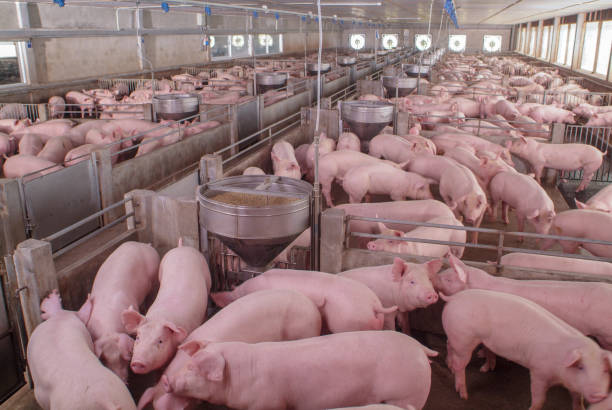
These production classes include
● boars and pregnant sows
● sows with piglets
● young pigs, three to 10 weeks old
● growing pigs up to slaughter at a live weight of 60 or 90 kg.
See the complete pig nutrition needs
What is the Best Pig Breed to farm with in South Africa
There are more than a 50 different pig breeds in South Africa that is popular for the production of meat. Taking a look at Best Pig Breeds to Farm with in South Africa
Setting up a pig farming business in South Africa is expensive and have a lot of hick ups, but once everything is in place it could be a extremely profitable business. There are a lot of breeds to choose from so decide carefully before you start buying breeding pigs and know exactly what your market will be.

.Farming South in Africa
What will your target be when farming with pigs?
- To sell Carcasses to Butcheries
- To sell live pigs directly from your farm
- To sell weaners
- To farm for lard
- Bacon, Ham or Meat and Sausage
- More Juicer meat or Meat with more Flavour
- Homestead, Free Range or Intensive Farming
We have put together the 7 top and most popular pigs to breed with and you can read all about it here
10 Most Common Pig Diseases in SA
Causes of Diseases in Pigs – In order to understand what causes disease in animals, we first need to know what disease is. Disease (also known as sickness) is any process that interferes with the way the different parts of the bodywork and looks. We do not normally consider injuries such as broken legs and cuts as diseases. Let’s look at the 10 Most Common Pig Diseases in South Africa
- Parasites
- Tapeworm
- Congenital Disease
- Viruses
- Cancer
- Bacteria
- Fungi
- Protozoa
- Dietary Problems
- Environmental diseases
Read in detail the causes of pig diseases and how to prevent them
How to sell your pigs in South Africa
You have raised your pigs but have no idea where to sell them. As a farmer, farming in South Africa is hard and selling your products for the right price can have some challenges, but by using one of these methods you will sell your pigs fast. Where and how to Sell your Pigs in South Africa and make the best Profit.
- Abattoir
- Local Townships
- Butcheries
- Directly from your Farm.
This is an brilliant article with in depth information on how to sell your pigs when you decide to become a pig farmer.
How to Sell Pigs and make a Profit

Farming South in Africa
How weight a pig with a rope
The best way to weigh a pig is with a crated digital scale but they are expensive and beginner farmers can’t afford them. Many pig farmers has asked me how do we weigh our live pigs as we do not have a livestock scale. (Well we do but it is not suitable for pigs and the max weight is only 350kg.) There is a way and if your pigs are tame it would be a fast simple proses. Lets look at how to How to weigh a pig without a scale by only using a rope.
You will need 3 basic items to weigh a live pig.
- A soft measuring tape or rope that you can measure afterwards
- Food (for distraction)
- Calculator
The formula of weighing a pig with a rope


See how to weight a pig with a rope
What about Vegetable farming in South Africa?
Vegetable farming in South Africa has become one of the most lucrative farming businesses in South Africa provided you have the right soil for the right vegetable and of course water. We have a many sort of vegetables and fruits in South Africa which means that there is a great variety to choose from. You need to find out what your town’s needs are before you decide to farm with vegetables. Speak to your local vegetable stores and fruit markets to see what they need and what is profitable.
If you are going to plant onions in a farming community that sells a lot of onions you might not get the prices that you expected. This can lead to a disaster as you might have to sell your onions to a vegetable market and that means that you will get bottom price.

Farming South in Africa
The fact that food production, and therefore food prices, are affected by weather, pests, and other unpredictable factors, makes this industry an exciting and opportunistic field for business.
Agriculture is an important regional driver of rural development, job creation and poverty alleviation. Focus on innovative ways to reconnect our food system with our economy and gain profitable yields in the process.
We will discuss the following Farming Topics on our Website
- When to Plant
- What to Plant
- Profitable Vegetable Farming
- How to prevent diseases on your crop
- Where to Sell your Vegetables
Vegetable Farming in South Africa gives you all the information regarding planting and harvesting your vegetables.
When to plant vegetables in South Africa?
We have put together a planting chart for all 9 provinces in South Africa that will tell you exactly what you can plant and when to plant it.
All seasons in South Africa can be planted and if you purchase or grow your own seeds the following planting chart of all Provinces in South Africa can be used as a guideline for planting Vegetables Visit the Planting Chart
Before you buy seeds and Plant them
It is advisable to he most accurate Daily Fruit and Veg Market Prices South Africa
See the yield in crops and use the data and analytics to help you decide what crops to plant and when to plant.
All Commodities are on the market list so that you can see the prices instantly.
General Farming in South Africa Explained
The most successful farmers of the present day are those who work in harmony with the forces and laws of nature which control the growth and development of plants and animals. These men and women have gained their knowledge of those laws and forces by careful observation, experiment and study
The observations begin Farming South in Africa
The root is regarded as the most important part of the plant to itself, and consequently to the plant grower.
The general truths or principles which state the conditions necessary for the growth and development of plant roots are regarded as the foundation truths or fundamental principles of all agriculture. These truths are as follows:
The roots of farm plants need for their best growth and development:
- A firm, mellow soil.
- A moist soil.
- A ventilated soil.
- A warm soil.
- A soil supplied with plant food.
A South African study of soils is made in connection with the root studies, as the two are so closely related.
After the study of roots and soils the other parts of the plant are considered in the order of their importance to the farmer or plant grower. The aim is always to get at fundamental facts and principles underlying all agricultural and horticultural practice.
The conditions necessary to root growth and development as the important factor constituting soil fertility, and in the last ten chapters takes up the discussion of certain farm operations and practices and their effects on these necessary conditions, and consequently their effect on the fertility of the soil.
The author extends gratitude to all who have in any way assisted in the preparation of this website, whether through advice, preparation of the text, preparation of the illustrations, or any other way in which he has received assistance.
Farming South Africa website is a result of the author’s and members research for these facts and truths as a student and farmer and his endeavor as a teacher to present them in a simple manner to others. Please share our article and subscribe to our website to get updated Farming in South Africa posts.
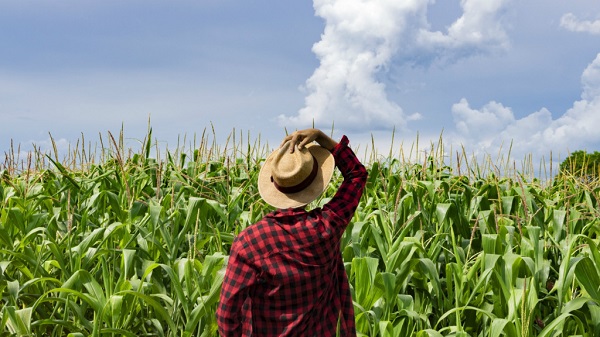
Farming in South Africa | Crop Farming | Livestock | Market Prices
- YouTube Channel: Farming South Africa
- Facebook Page: Farming Life
- General Farming Farming South Africa
- Back To Home Page: Chicken Farming South Africa
Farming in South Africa | Crop Farming | Livestock | Market Prices
Tags: Farming in South Africa | Crop Farming | Livestock | Market Prices, vegetable farming South Africa, Pig Farming South Africa, Chicken Farming South Africa, pig farming South Africa,